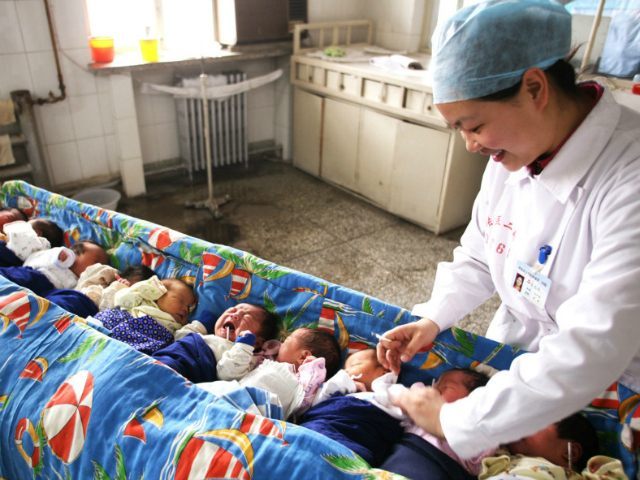According to China’s state-run Xinhua news agency, hospitals have been overwhelmed by a surge of babies following the end of the nation’s one-child population-control policy.
To be more specific, it was not so much ended as upgraded to a “two-child” policy. The Chinese populace has evidently responded to the looser restrictions with enthusiasm, coupled with “the belief that people born in the Year of Monkey are smart and confident,” as one sociologist put it.
Some sources, such as a Bloomberg News report from last month, place an even heavier emphasis on the Chinese belief that the new Year of the Monkey is a far more auspicious time for having children than the outgoing Year of the Sheep, or the upcoming Year of the Chicken. There was a significant spike in births during the Year of the Dragon in 2012, the best year for having children under Chinese beliefs. However, the Bloomberg report noted that the undesirable Year of the Sheep in 2015 did not see a sharp reduction in the birth rate.
Ding Zhigang, an anesthetist at Beijing Obstetrics and Gynecology Hospital, told Xinhua he has assisted with dozens of deliveries, working over 20 hours straight during the Lunar New Year holiday.
“There were so many women booked in to give birth that I had to work around the clock. When I finished work yesterday, I was dead on my feet. This is going to be a very, very busy year for us,” said Ding.
Beijing’s Health and Family Planning Commission agreed with Ding’s prediction of a busy year ahead, estimating 300,000 children will be born in Beijing alone, which will be 50,000 more than last year. Two million new babies are expected nationwide.
The baby boom has led to reports of long hours from many doctors and medical assistants, plus a shortage of beds, obliging pregnant women to share hospital rooms and sleep in hallways. Larger provinces are reportedly in need of thousands more midwives. One obstetrician said his hospital staff was so busy they had trouble finding time for meals or restroom breaks.
Bloomberg News suggests the slumping Chinese economy and higher cost of raising children may limit the baby boom to more affluent families, which is exciting news for companies that cater to well-heeled new parents in China. Sales growth of at least 3 percent for baby-related products is expected.
The first wave of new parents have a little extra money to spend, because NBC News notes that having a second child before 12:01 AM on January 1st would have saddled parents with a $12,000 “birth control tax.”
NBC notes the one-child policy, which “spawned the abuses of forced abortions and sterilizations,” was abandoned in part because far more boys were born than girls, leading to a possible “demographic crisis caused by an aging population, shrinking labor force, and gender imbalance.”
In other words, China deliberately gave itself the same age-gap financial crisis facing less repressive nations across the developed world, as rising life spans and declining birth rates mean fewer taxpaying young workers per elderly retiree.

COMMENTS
Please let us know if you're having issues with commenting.